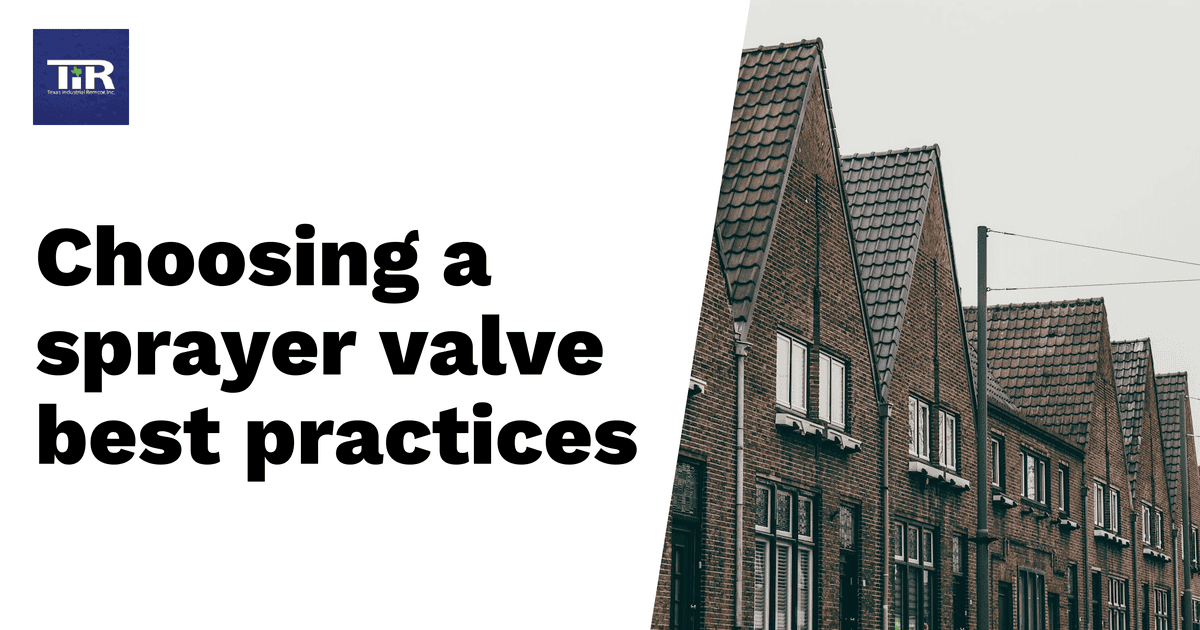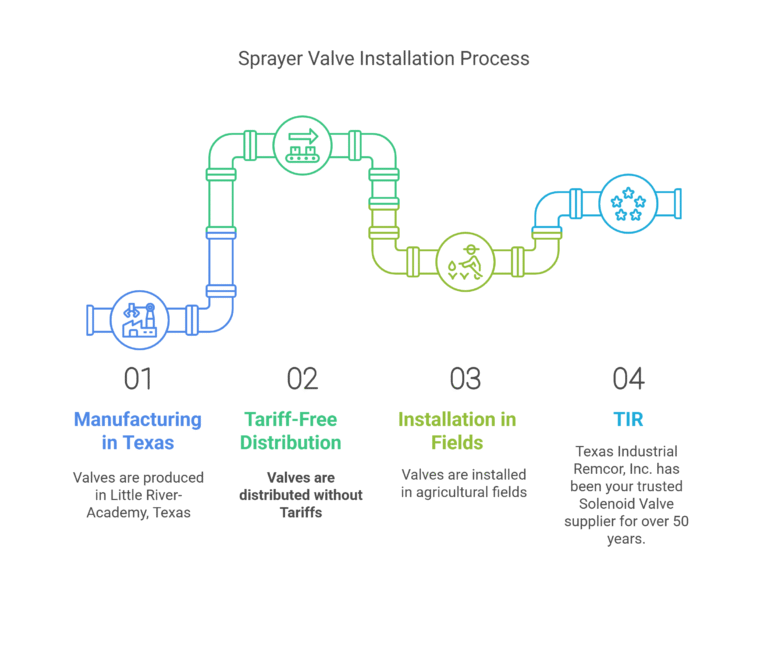Best Practices for Choosing a Sprayer Valve
Choosing the right sprayer valve is crucial for efficiency and safety in various applications. Start by understanding the application’s specific needs, whether it’s agriculture or turf spraying. Next, check material compatibility with the fluids to prevent corrosion; for instance, stainless steel may be necessary for harsh chemicals. Consider flow rate and pressure ratings to ensure optimal performance without inefficiencies. Also, think about actuation types—like solenoid valves—that allow quick response times. Ensure proper sizing and port configurations suit your system’s requirements, while also selecting easy-to-maintain valves from reputable manufacturers like Texas Industrial Remcor, Inc.for long-lasting reliability and support.
1. Understand the Application for Your Sprayer Valve
Choosing the right sprayer valve starts with understanding its intended application. Different fields require specific valves tailored to their unique needs. For instance, agricultural sprayers often need valves that can handle various chemicals and fertilizers, while turf spraying systems require valves that can efficiently distribute water and nutrients to the soil. Similarly, street cleaning applications may demand valves built to withstand harsh conditions and abrasive materials. By identifying your specific use case—whether it’s for farming, landscaping, or industrial purposes—you can narrow down your options to valves that are designed for those environments, ensuring optimal performance and longevity.
2. Ensure Material Compatibility with Fluids
Choosing the right material for your sprayer valve is critical, especially when dealing with various fluids. Different fluids, such as corrosive chemicals, solvents, or even simple water, can react differently with materials. For instance, if you plan to use a valve for agricultural chemicals, you might need a valve made from stainless steel or high-grade plastics that can withstand harsh conditions and prevent corrosion. On the other hand, if the valve is meant for clean water, a standard plastic may suffice. It’s also important to consider temperature ranges; some materials may lose integrity at high temperatures while others may become brittle in cold conditions. Always check compatibility charts provided by manufacturers to avoid costly failures or leaks.
- Consider the chemical composition of fluids to avoid corrosion.
- Ensure valve materials can withstand temperature variations.
- Look for compatibility with solids or particulates in the fluids.
- Evaluate the effects of fluid viscosity on material selection.
- Assess the potential for chemical reactions with valve materials.
- Take into account the frequency of fluid changes and their chemical properties.
- Review industry standards for material compatibility in similar applications.
3. Calculate Flow Rate Requirements
Calculating the flow rate requirements is essential when choosing a sprayer valve. The flow rate represents how much fluid the valve needs to handle within a given time frame, typically measured in gallons per minute (GPM) or liters per minute (LPM). This requirement is directly influenced by the application; for instance, agricultural sprayers may need higher flow rates to cover large fields quickly, while turf spraying might require lower rates for precision.
To determine the necessary flow rate, consider the total area to be sprayed and the desired application rate per unit area. For example, if you need to apply 50 gallons per acre and you plan to cover 10 acres in one hour, your flow rate must be 500 GPM. It’s also important to account for potential pressure drops across the system, as a valve that cannot maintain the required flow might lead to uneven coverage or poor performance. Thus, knowing your flow rate requirements upfront ensures you select a valve capable of delivering the necessary volume efficiently.
| Application | Required Flow Rate (GPM) | Valve Size | Remarks |
|---|---|---|---|
| Agriculture Spraying | 10-20 | 1 inch | Select based on nozzle requirements. |
| Street Cleaning | 15-30 | 2 inch | Higher flow for debris removal. |
| Industrial Applications | 20-50 | 3 inch | Consider pressure loss over distance. |
| Turf Spraying | 5-15 | 3/4 inch | Adjust flow to avoid turf damage. |
| Firefighting | 50-150 | 4 inch | Must meet high demand for efficiency. |
4. Consider Pressure Ratings for Safety
When selecting a sprayer valve, it’s crucial to consider the pressure ratings to ensure safety and proper functionality. Each valve has a maximum operating pressure, which must not be exceeded during operation. Using a valve that cannot handle the system’s pressure can lead to catastrophic failures, such as leaks or even explosions, posing risks to both equipment and personnel. For instance, in agricultural applications where high-pressure systems are common, a valve rated for at least the maximum pressure of the sprayer system is essential. Always check the manufacturer’s specifications to confirm that the valve meets or exceeds your system’s requirements.
5. Decide on Type of Actuation
Choosing the right type of actuation for your sprayer valve is crucial for ensuring the efficiency and effectiveness of your fluid control system. There are three main types of actuation to consider: manual, solenoid, and motorized.
Manual valves require a physical action to open or close, making them simple and reliable but less convenient for large or automated systems. Solenoid valves, on the other hand, are electrically operated and provide fast actuation, allowing for remote control and automation. This is particularly useful in applications where quick response times are necessary, such as in agricultural spraying or industrial processes. Motorized valves offer precision control and can be integrated with automated systems, making them ideal for complex applications that require frequent adjustments.
For example, if you’re working in agriculture and need to quickly adjust flow rates based on varying conditions, a solenoid valve might be the best choice. Conversely, for a simple, straightforward application where automation is not needed, a manual valve could suffice. Ultimately, the decision should align with your operational needs and the level of control required for your specific application.
6. Select Size and Port Configuration
Selecting the right size and port configuration for your sprayer valve is crucial for optimal performance. The size of the valve should match the inlet and outlet sizes of your system to ensure proper fluid flow. For example, if your sprayer system has 1-inch pipes, choosing a valve with a 1-inch inlet and outlet will minimize pressure loss and maintain efficiency. Additionally, consider the overall dimensions of the valve to ensure it fits within your system’s layout. Port configurations can vary; some valves may have multiple ports for different functions or connections. Ensure that the configuration aligns with your specific application needs, whether it requires a single outlet or multiple connections for different spray patterns. Proper sizing and configuration not only enhance the valve’s effectiveness but also prevent potential leaks and operational issues.
7. Choose Easy Maintenance Options
When selecting a sprayer valve, it’s essential to consider ease of maintenance. Opting for valves that are designed for simple disassembly and reassembly can significantly reduce downtime during servicing. For instance, valves with fewer components or those that feature quick-release mechanisms can be serviced quickly without the need for specialized tools. Additionally, look for options that come with clear maintenance instructions or support from the manufacturer. This ensures that even if you’re not a valve expert, you can perform routine checks and repairs with confidence. Choosing a valve that allows easy access to internal parts can also save time and labor costs in the long run, making it a smart investment for your fluid control system.
8. Research Manufacturer Reputation
When selecting a sprayer valve, it’s crucial to research the reputation of the manufacturer. A well-established company often indicates reliability and quality. Look for manufacturers that have been in the industry for several years, as they are more likely to have refined their products and processes. Check for certifications like ISO 9001, which show that the manufacturer adheres to recognized quality management standards. Additionally, read customer reviews and testimonials to gauge the experiences of other users. Companies with a history of good customer service and support can make a significant difference, especially if you face issues post-purchase. For example, if a manufacturer is known for prompt responses and effective solutions, it can save you time and frustration in the long run.
9. Evaluate Cost-Effectiveness of Valves
When selecting a sprayer valve, it’s essential to evaluate its cost-effectiveness. This involves looking beyond the initial purchase price. For instance, a valve that costs more upfront may offer better durability and performance, leading to lower maintenance and replacement costs over time. Consider how often the valve will be used and the conditions it will face. For high-volume applications, investing in a more robust valve can save money in the long run by reducing downtime and repair needs. Additionally, think about energy efficiency; some valves are designed to minimize power consumption, which can lead to significant savings on operating costs. Always compare the total cost of ownership, which includes installation, maintenance, and potential energy savings, to make an informed decision.
10. Confirm Technical Support and Warranty
When selecting a sprayer valve, it’s essential to confirm that the manufacturer offers robust technical support and warranty options. This can make a significant difference, especially during the installation phase or if issues arise during operation. For instance, if you encounter a malfunction or need help with setup, having access to knowledgeable support staff can save you time and reduce frustration. A warranty also provides peace of mind, ensuring that you’re covered for repairs or replacements if the product does not perform as expected. Look for manufacturers that offer comprehensive warranties, ideally covering parts and labor, which can be vital for maintaining operational efficiency.
11. Overview of Texas Industrial Remcor, Inc.
Texas Industrial Remcor, Inc. is a leading provider of sprayer valve solutions, known for its expertise in designing and manufacturing valves suitable for various fluid control applications. The company serves multiple industries, including agriculture, automotive, and landscaping, with a strong focus on quality and innovation. Their product range includes solenoid valves that provide quick actuation for efficient fluid management. For instance, their E-CHIP™ valves enhance energy efficiency by reducing power consumption and operating temperatures, making them an ideal choice for modern applications. With a commitment to comprehensive customer support, Texas Industrial Remcor ensures that clients receive detailed information and guidance on selecting the right valve for their specific needs.
12. Explore Solenoid Valve Technology
Solenoid valves are an essential choice for many sprayer applications due to their quick actuation and efficient operation. These valves use an electric coil to open and close the fluid pathway, allowing for rapid response times. For instance, in agricultural sprayers, solenoid valves can control the flow of fertilizers or pesticides with precision, ensuring that the right amount is delivered at the right time.
One of the key advantages of solenoid valves is their ability to be operated remotely, making them ideal for automated systems. This means that operators can manage the spraying process from a distance, improving efficiency and safety. Additionally, many modern solenoid valves are designed to minimize power consumption and reduce operational temperatures, which enhances the overall efficiency of the system.
When selecting a solenoid valve for your sprayer, it’s important to consider factors such as the voltage requirements and the duty cycle. For example, a valve used in a continuously operating system may need to be rated for a higher duty cycle compared to one that is used intermittently. By understanding these aspects, you can choose a solenoid valve that best suits your specific needs, ultimately improving the performance and reliability of your spraying operations.
13. Applications of Our Valve Solutions
Texas Industrial Remcor’s valve solutions are designed for a wide range of applications, ensuring versatility and efficiency in fluid control. In agriculture, our valves are used for irrigation systems and pesticide spraying, where precision and reliability are crucial. For street cleaning, our valves handle high-pressure water flow, helping municipalities maintain clean and safe public spaces. In the landscaping sector, they are essential for turf spraying, allowing for uniform distribution of fertilizers and pesticides, which enhances plant health. Our valves also find applications in automotive industries for fuel and coolant management, as well as in industrial settings for controlling various fluids in manufacturing processes. Each application requires specific valve characteristics, and our products are engineered to meet those unique demands, ensuring optimal performance across different environments.
14. Commitment to Customer Support and Innovation
Choosing a sprayer valve is not just about the technical specifications; it’s also about the support you receive from the manufacturer. A strong commitment to customer support can significantly enhance your experience and ensure that you get the most out of your valve investment. Look for manufacturers that offer comprehensive support, including technical assistance, installation guidance, and troubleshooting help. For instance, Texas Industrial Remcor, Inc. provides extensive resources and expert advice to help customers select the right valve for their specific applications.
Moreover, innovation is crucial in this field. Companies that invest in research and development can offer advanced solutions that improve efficiency and performance. For example, Texas Industrial Remcor’s E-CHIP™ valves not only reduce power consumption but also operate at lower temperatures, making them a smart choice for energy-conscious users. By choosing a manufacturer that prioritizes innovation and customer support, you can ensure that your sprayer valve meets evolving industry demands and continues to operate effectively over time.
Frequently Asked Questions
1. What factors should I consider when selecting a sprayer valve?
When choosing a sprayer valve, think about the type of spray you need, the size of the valve, the pressure range, and the chemical compatibility with what you plan to spray.
2. How do I determine the right size valve for my sprayer?
To find the right size valve, consider the flow rate you need for your sprayer and check the manufacturer’s specifications to match the valve size with your sprayer’s requirements.
3. Can different types of sprayer valves affect my spraying performance?
Yes, different types of valves, like ball valves or needle valves, can affect how smoothly and evenly you spray, as well as the control you have over the spray pattern.
4. What materials are best for sprayer valves?
The best materials for sprayer valves typically include brass, stainless steel, and high-quality plastics, as they offer good durability and resistance to chemicals.
5. How important is it to choose a valve that matches my sprayer’s pressure?
It’s very important because using a valve that can’t handle your sprayer’s pressure can lead to leaks or failures, affecting your spraying operation and results.
TL;DR Choosing the right sprayer valve involves understanding the application, ensuring material compatibility, calculating flow rates, considering pressure ratings, and deciding on actuation type. Also, select appropriate size and port configuration, look for easy maintenance, research manufacturer reputation, evaluate cost-effectiveness, and confirm technical support and warranty. Texas Industrial Remcor, Inc. offers quality valve solutions for various applications with a focus on customer support and innovative technologies.


